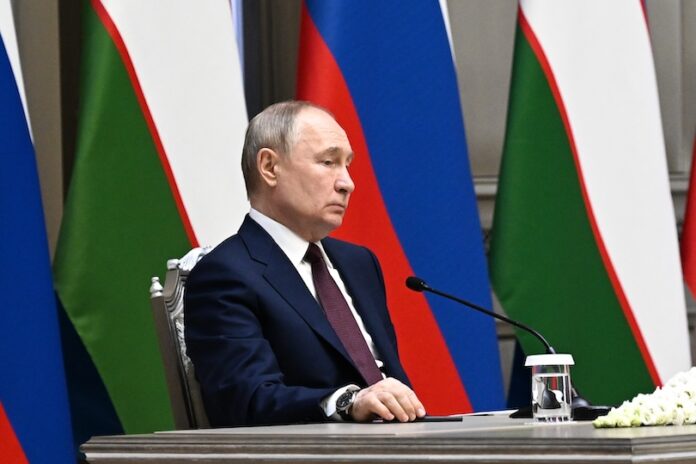Sitting next to Vladimir Putin at the St. Petersburg International Economic Forum in June 2022, the President of Kazakhstan, Kassym-Jomart Tokayev, declared that Kazakhstan does not recognise any quasi-state territories, including Taiwan, Kosovo, South Ossetia, Abkhazia, Lugansk and Donetsk. At the Astana Summit of the Commonwealth of Independent States in October of the same year, the president of Tajikistan, Emomali Rahmon, addressing Vladimir Putin directly, stated, “we have always respected the interests of our main strategic partner, [Russia]. We want respect, too.” What explains this audacity of leaders from the Central Asian region, which has always been considered Russia’s backyard? One of the main reasons behind the weakening of Moscow’s authority in the region lies in Russia’s invasion of Ukraine. However, an underlying cause that has nurtured distrust and triggered the decline of Russia’s authority is how Moscow has systematically used and abused its great power status in the region.
Realist scholars such as Kenneth Waltz (1979) and John Mearsheimer (2001) define great powers as states that possess and are capable of using military, economic, and political power to influence international affairs. That being said, they often overlook the societal aspect of great powers, placing paramount – and sometimes exclusive – importance on crude power. Great powers, however, become and remain as such as long as they are recognised by others as having special rights and duties in international society (Bull 1977). This recognition is earned when major powers protect international society by maintaining the balance of power and safeguarding the sovereignty of smaller states. Russia’s abuse of its dominant position in Central Asia and its subsequent invasion of Ukraine demonstrate how the misuse of crude power in the contemporary international system undermines great power status and leads to its decline.
After the end of the Cold War and the collapse of the Soviet Union, Russia was still geographically big, but it proved to be a weak state that was deeply entangled in a myriad of domestic problems. Russia regained its great power status under Putin’s rule, symbolically marked by his 2007 Munich speech. Russia’s return to great power politics is largely attributed to its assertive role in countering American global expansion, including creating a backlash against democracy promotion. Moscow succeeded in this endeavour during the outbreak of so-called colour revolutions in the post-Soviet region. For instance, Russia helped ensure the regime survival of Central Asian states when the West criticised and imposed sanctions on them for human rights violations, which could potentially incite mass protests in the region. Moscow, individually and through international organisations, provided diplomatic support and economic assistance, helping local leaders maintain their legitimacy and prevent potential social instability. Thus, Russia systematically contributed to preserving the international society of authoritarian states by resisting the democracy promotion efforts of the US and the European Union. These efforts culminated in Uzbekistan’s voluntary accession to the Collective Security Treaty Organization in 2005, making it the last recalcitrant state from Central Asia to join Russian political and military projects.
The foregoing duties that Russia fulfilled granted Moscow special rights in the region. The Kremlin enjoyed significant influence in determining issues of strategic importance, whether in military, political, or economic spheres in Central Asia. For instance, Russia had exclusive rights to establish military bases in the region and closely monitored political contacts between the five Central Asian states and the West. Central Asian republics also supported Russian international efforts by voting in favour of Moscow’s positions within international organisations. Additionally, Moscow promoted the Russian language and culture in the region. Economically, Russia controlled major gas pipelines and trade routes, and it has been the main destination for Central Asian migrants.
As a result of its exclusive position in the region, Russia maintained a mentality of “the strong do what they can, and the weak suffer what they must” towards the Central Asian republics. The Eurasian Economic Union (EEU), which includes Armenia, Belarus, Kazakhstan, Kyrgyzstan, and Russia, primarily advances Moscow`s geopolitical goals rather than fostering economic integration among its member states. Although the fundamental principles of the EEU are to ensure freedom of movement and the free movement of goods by eliminating customs duties and other non-tariff barriers, the Kremlin violates these principles whenever it deems necessary. Additionally, Russia has used anti-immigration policies as political leverage against Kyrgyz, Tajik, and Uzbek governments, which in turn have fostered xenophobia and racism against Central Asia migrants, negatively impacting the overall attitude of people from the region towards Russia.
Russia also exploited its economic and strategic advantages inherited from the USSR against the region. One of the Soviet legacies that has had a detrimental influence on the sovereignty of Central Asian states is the fact that major routes and the transportation of energy resources out of the region primarily led through Russia. This gave Moscow a strategic advantage in utilising its transit potential to gain political concessions from the Central Asian republics by leveraging the Northern Corridor and the Central Asia-Center pipeline. Russia consistently tried to forestall any attempts to diversify trade and gas pipelines in the region and to disrupt potential integration processes among the five republics of Central Asia.






